All We Can Save
Air Date: Week of October 30, 2020
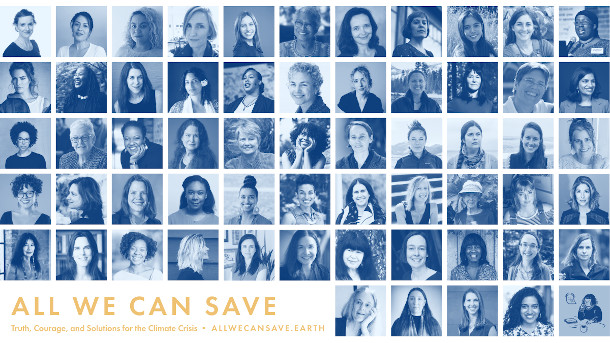
More than 40 women contributed to All We Can Save, including climate scientist Katherine Hayhoe, author Alice Walker, and NRDC president Gina McCarthy. (Photo: Courtesy of Ayana Elizabeth Johnson)
Despite tremendous contributions to the climate movement, women are underrepresented at international climate talks, executive leadership of environmental organizations, and the legal systems that create and uphold change. In response, an influential new collection of essays, All We Can Save: Truth, Courage, and Solutions for the Climate Crisis, seeks to elevate women’s voices. Ayana Elizabeth Johnson, who edited the anthology with Katharine Wilkinson, speaks with Host Steve Curwood to discuss the importance of diversity and inclusion when it comes to fighting climate disruption.
Transcript
CURWOOD: It’s Living on Earth, I’m Steve Curwood.
All too often the work of women in science is overlooked. Eunice Newton Foote is now regarded as the first scientist to publish research showing that carbon dioxide could affect the Earth’s temperature. But in August of 1856 when her paper was presented at the American Association for the Advancement of Science it was read aloud by a man. And for many years Irish Physicist John Tyndall was credited as the originator of climate science though his paper on climate came three years after Eunice Newton Foote published hers. And curiously, Mr. Tyndall would likely have known of her work as he had a paper on color blindness published in the very same issue of the AAAS journal where Ms. Foote’s climate paper appeared. Today women are still routinely underrepresented in climate science, international climate talks and the leadership of environmental organizations. To advance the voices of women in the climate movement Katharine Wilkinson, a writer, and Ayana Elizabeth Johnson, a marine scientist and podcaster, edited a collection of essays and poems. It’s called All We Can Save: Truth, Courage, and Solutions for the Climate Crisis, featuring 41 women who are scientists, activists, policymakers, poets and journalists and half of whom are of color. Ayana Elizabeth Johnson joins us now, welcome to Living on Earth!
JOHNSON: Thanks so much for having me.
CURWOOD: You know, sometimes people say the original sin of America was slavery, dealing with Black people, of course, women didn't have the right to vote in that constitution either. To what extent that those things need to be rectified before America will seriously deal with climate disruption, do you think?
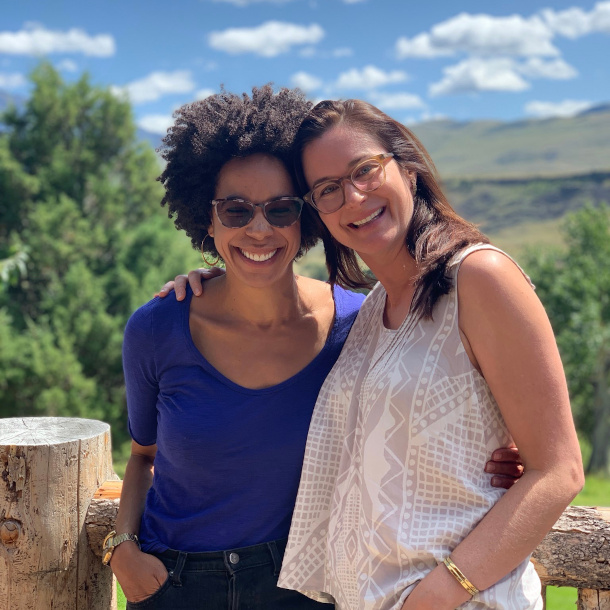
Ayana Elizabeth Johnson (left) co-edited All We Can Save with Katharine Wilkinson. (Photo: Jennifer Robinson)
JOHNSON: And you know, one could argue certainly that the original sin was how he treated the people who are already here, the indigenous peoples, and the treaty rights that are still being ignored and stomped upon. So I think America has plenty of sins to grapple with, unfortunately, and those original sins have set us up for failure when it comes to problems where we need all hands on deck like the climate crisis. And so I think the challenge of our time is that we have to deal with all of these issues at once, unfortunately. And as much as I wish we could deal only with climate because that is certainly a big enough challenge on its own, our ability to address the climate crisis is intertwined with who has resources, whose voices are we listening to? Which leaders are we supporting? And so with this book, we were hoping to elevate dozens of women who are already doing critical work on climate and saying: these are some of the voices we really need to be listening to in this moment. And it's not that, they're not writing about being women. They're writing from the perspective of you know who they are. But these are not all essays about feminism. They're not about gender. They're essays from NASA climate scientists, from farmers, from journalists, from architects, from artists, from activists, who are all experts in their particular field and sharing their lessons about the work that they've done and the way forward. I mean, we've have an essay from Mary Anne Hitt, who's led the beyond coal campaign for the Sierra Club for a decade, which has shut down over 320, coal fired power plants in the United States, taking coal from 50% of our energy to 20% in just a decade. That's incredible. There's so much we can learn from these success stories, not just avoiding each other's failures, but actually repeating each other's successes. And so that is, I think, one of the beautiful offerings of this anthology. But one of the beautiful opportunities of this moment is to say, to look around and say, what's working? And what can the future look like if we get it right? And really lean into that sense of possibility.
CURWOOD: How did you come to the decision to edit an anthology with only female voices?
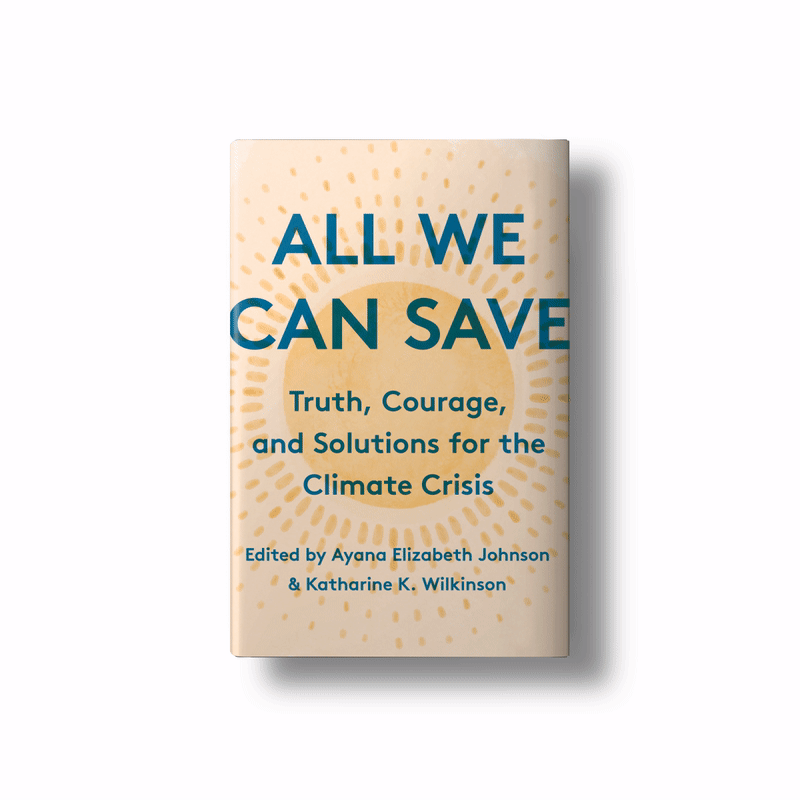
The collection includes essays and poems from scientists, journalists, policymakers, activists, and other key leaders in the climate movement. (Photo: Courtesy of Ayana Elizabeth Johnson)
JOHNSON: Because men had plenty of platforms and microphones. And the moment that Katharine and I decided to create this book, we were actually at the Aspen Institute at a climate conference. And we were just like, it's the same people with the money and the power, deciding who gets the microphones, and who gets the funding for their work. And like, this just is not gonna work. Like it's just not enough, no matter how intelligent and well meaning this small group of rich white men is, they will never be able to solve the problem on their own.
CURWOOD: So why did they invite you?
JOHNSON: I don't know. Maybe they regret it now. But I think there was this realization: oh, we're supposed to listen to women. Oh, we're supposed to listen to scientists. Oh, we're supposed to listen to people of color. Oh, how handy that Ayana is all three. I mean, that has been sort of this year, in general, for me has been one of a lot of invitations and media attention, as we are in this confluence of climate crisis and crisis of racial injustice and crisis of our democracy. But I think there is an honest goodwill from this, you know, group of people who hold the power, knowing that things have to change, knowing that we do need to bring more people in. And I appreciate that. But unless we're turning over dollars, microphones, power, decision making, along with that realization, then it's really just a token.
CURWOOD: To what extent do you think attitudes are really shifting to say, well, it's not just a noblesse oblige to have some women or some people of color, but that, in fact, if society doesn't fully include everyone that it won't work?
JOHNSON: Yeah, I do think there is a realization that the status quo is clearly not working. Right? And so I think people are grasping for leadership, grasping for solutions, and having to look in places where they have not been looking before, they are suddenly seeing all sorts of things that were there. But that didn't fit what people thought of as environmentalism or climate work. And I'm really thankful that people's eyes have been pried open in the last few years. But there's still obviously so much more work to do. I mean, I think what we're seeing, you know, there's a lot of room for improvement in philanthropy, for example, when we think about whose work is funded, we know that women and people of color have a very hard time for funding their work, whereas often white men come in with like a two page summary and are given millions of dollars to give it a shot. And, you know, we need to be extending that same benefit of the doubt to people who have proven track records in their communities.
CURWOOD: One of the themes of your collection is the leadership and the need for heart centered leadership instead of just head centered leadership,
JOHNSON: Yeah.
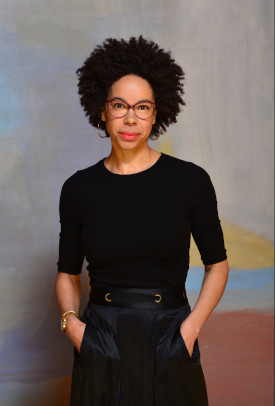
Ayana Elizabeth Johnson is a marine biologist, policy expert, and climate activist. (Photo: Marcus Branch)
CURWOOD: Talk to me about heart centered leadership, why it's important, and in particular, the gender relationship as well.
JOHNSON: I think the way that, that a lot of people have been approaching our climate challenges for decades now has been as a technical problem, this wishful thinking, if we just got all the right engineers in a room, maybe a few politicians and rich people, too, that we could like somehow, up, just come up with a quick fix, an easy solution, as if this were really just about solar panels and electric cars. But this is a much more fundamental problem with the way that we live on this planet and with each other, and how society is structured and building an economy around fossil fuels. And so we need to transform a lot of systems, which is an unfortunately, much larger task than just getting off of coal and to renewables, right? And so this idea of heart centered leadership, is leading from a place of care, from a need to heal nature and ecosystems, as well as rifts in society, as we think about what the future looks like. And these traits of, of leading with the heart and leading with love are qualities that are sort of stereotypically associated with feminine leadership. But of course, we know that these qualities are open to people of any gender, anyone can lead from a foundation of love. And I would certainly encourage everyone to take that on. And it emerged as a theme in the book, which, when we didn't seed on purpose, and we didn't notice until we read the full manuscript. But that really is what is motivating these leaders, right? Even the scientists, it's like love of this magnificent planet, right? Like, planet Earth is incredible. And how could you not love all of these wonders? And how could you not love society and our rich cultures and all that is possible, and grandparents and children and all of it. And so I think we have this opportunity to envision an embrace, I would say, a very different way of, of dealing with climate change that is less about technology, and less about being right and more about how we bring the best of everyone to the table on sort of evolving as a society, to one where we can flourish as a part of nature.
CURWOOD: So you're trained as a marine biologist, but I don't see breathing apparatus behind you there or a bench. I think you have what, let's see, you got a book you're writing, you edited one, you have a podcast you host a couple of social service agencies that you run. So how do you see yourself as a scientist? To what extent are you like Katharine Hayhoe, who actually wrote in your book that communicating sciences really is perhaps as important as science itself?
JOHNSON: Yeah. And she's an incredible example of that. I mean, her climate research is critically important and published in top journals. And she dedicated a lot of time to making sure that that science doesn't just stay within academia, that she explained it to the public and gives everyone an opportunity to understand what the stakes are. I am no longer doing field research, scuba diving and counting fish, although I do sometimes get a little bit wistful for those days and all the all the time I spent in the Caribbean. But I think for me, we're at this moment in history where I feel like everyone needs to do an assessment of how they can be most useful, right? We are facing multiple crises at the same time. We’re facing the climate crisis. We're facing a public health crisis. We're facing a crisis of our democracy. We're facing a crisis of racial injustice and of economic inequality. And all of these are for mashing up together in this moment, and 2020 has brought all of that right to the surface in a way that we can't ignore anymore. And for me, I've spent the last four years essentially thinking about how can I be most useful in this moment, as a trained marine biologist, as someone with a lot of experience in policy, as a writer and a communicator, as a woman, as a Black person, as a Brooklyn native, all of these are core parts of who I am as, as the daughter of a Jamaican immigrant, as the daughter of a farmer. How can I be a useful part of this conversation? And so this anthology is one manifestation of that piece of how it can be most useful and, and you'll see the threads of ocean conservation come through in the curation, in the fact that we have a seaweed farmer writing about that as a climate solution, in that we have the director of resiliency for the City of New York writing about the coastal cities that she has worked in, including Honolulu and New Orleans, in addition to New York, in that we have a landscape architect writing about coastal ecosystems and how we can do landscape architecture as a way of protecting coastal communities. But I think, you know, I've had to re envision my role and what I can contribute because the world is changing so quickly.
CURWOOD: Before you go, as you and your co-editor are wrapping up the book, you make the observation that dealing with the climate emergency is "gnarly."
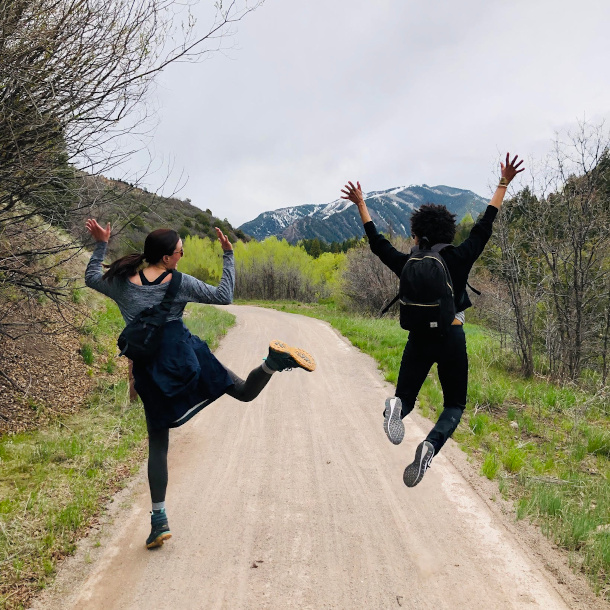
Ayana Elizabeth Johnson (right) and her co-editor Katharine Wilkinson (left). (Photo: Jennifer Robinson)
JOHNSON: Yeah.
CURWOOD: So expand on that for me. And what is the solution when something is "gnarly?"
JOHNSON: So to answer that question, I'd love to read a short passage from the end of the book.
CURWOOD: Sounds good, please.
JOHNSON: So the last essay has a paragraph about each of the words in the title: All We Can Save, and the "Can" paragraph I think, is probably the best way to answer your question.
[READING]
Can speaks to sheer determination. This [bleep] ain't over yet, possibility still exists as documented in data-driven analysis of climate solutions and temperature trajectories. And as imprinted in the persistence of life, despite all odds, we are a miracle. Our task and our opportunity is to face a seemingly impossible challenge, an act in service of what is possible. So what can I do? It's an increasingly prevalent question, which is a very good thing. But the answers offered are often trite, consumerist, and incomplete. And often the question should be, what can "we" do? How can we depart this perilous path? These are questions to live into every day for the rest of our lives. We can answer them and answer them again and again, by considering what good work is unfolding around us, and what invitations we may already have received, and what gifts we might have to offer or to offer more deeply. From personal acts to professional prowess to political participation, our layers of agency are more profound than we may realize. Our choices and voices, our networks, dollars and votes, our skills and ingenuity. These are all openings for "can." Enough of what we cannot achieve. Can is the drumbeat of those who refuse to give in to destruction, who rise again and again with life force.
CURWOOD: Ayana Elizabeth Johnson is co-editor of All We Can Save: Truth, Courage, and Solutions for the Climate Crisis.
Links
Read more about Ayana Elizabeth Johnson
Learn more about All We Can Save
Ayana Elizabeth Johnson co-hosts the How to Save a Planet podcast
Living on Earth wants to hear from you!
Living on Earth
62 Calef Highway, Suite 212
Lee, NH 03861
Telephone: 617-287-4121
E-mail: comments@loe.org
Newsletter [Click here]
Donate to Living on Earth!
Living on Earth is an independent media program and relies entirely on contributions from listeners and institutions supporting public service. Please donate now to preserve an independent environmental voice.
NewsletterLiving on Earth offers a weekly delivery of the show's rundown to your mailbox. Sign up for our newsletter today!
 Sailors For The Sea: Be the change you want to sea.
Sailors For The Sea: Be the change you want to sea.
 The Grantham Foundation for the Protection of the Environment: Committed to protecting and improving the health of the global environment.
The Grantham Foundation for the Protection of the Environment: Committed to protecting and improving the health of the global environment.
 Contribute to Living on Earth and receive, as our gift to you, an archival print of one of Mark Seth Lender's extraordinary wildlife photographs. Follow the link to see Mark's current collection of photographs.
Contribute to Living on Earth and receive, as our gift to you, an archival print of one of Mark Seth Lender's extraordinary wildlife photographs. Follow the link to see Mark's current collection of photographs.
 Buy a signed copy of Mark Seth Lender's book Smeagull the Seagull & support Living on Earth
Buy a signed copy of Mark Seth Lender's book Smeagull the Seagull & support Living on Earth

